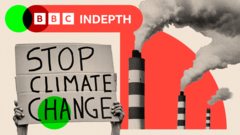As the US contemplates withdrawing from global climate talks under President-elect Donald Trump, China is positioning itself as a cooperative leader at COP29. With significant climate funding pledges and a focus on renewable energy, China's increased engagement could reshape international climate dynamics.
COP29: China's Rise Amidst US Withdrawal Signals New Era for Climate Negotiations

COP29: China's Rise Amidst US Withdrawal Signals New Era for Climate Negotiations
The shifting dynamics at COP29 highlight China’s emerging leadership as the US steps back from climate commitments, indicating potential new paths for global climate negotiations.
In a revealing moment at COP29, one of the chief negotiators from a leading country expressed frustration over the obstructionist behaviors witnessed during the conference. As the atmosphere thickened with similar complaints echoing throughout the gathering, sentiments prevailed that this could be one of the least productive COPs yet. Those feelings were compounded by concerns surrounding the impending withdrawal of the United States from the COP climate process under President-elect Donald Trump, who has publicly derided climate action.
However, in a surprising twist, the focus turned to China, which has been showing a markedly different negotiating style amid these discussions. Observers noted that China might be ready to assume a more prominent role in climate negotiations, a significant departure from its previous mixed approach.
Historically, China has taken a dual stance during these summits—at times aligning with Western countries on renewable energy goals while also serving as a stumbling block in negotiations. An illustrative instance of this occurs at COP15 in Copenhagen, where China resisted pressures to accept accountability measures in climate agreements, ultimately leading to a non-binding resolution widely regarded as inadequate.
This year, however, the narratives shifted. Reports emerged that China had disclosed how much it had invested in climate efforts globally, announcing over $24 billion in funding directed to developing nations for climate-related initiatives since 2016. This transparency has captured the attention of onlookers, symbolizing a potentially transformative stance from the traditionally reticent nation.
While classified as a developing nation in these talks, China’s economy positions it as a major player, and it has thus far resisted calls from developed nations to alter its status, maintaining a beneficial position in international climate finance discussions. Presently, discussions are ongoing regarding a promised $100 billion annual fund now insufficient to meet the growing needs of developing countries amidst their energy transition efforts.
Innovations emerging from China—specifically in solar panels and electric vehicles—are a testament to its growing dominance in renewable technology. Of particular note is China’s Belt and Road Initiative, aimed at enhancing connectivity and trade routes while promoting renewable technologies, further asserting its influence on global markets.
As the world navigates through this transformative era in climate politics, the implications of China's more assertive position could lead to shifts in global agreements and negotiations frameworks. While the US may retreat, experts suggest that China could play a strategic role in facilitating discussions among both developing and developed nations.
The next phase of climate negotiations may very well pivot on economics over politics, suggesting that the global push for energy innovations and green technology will reshape the dialogue at COP. Though the challenges remain daunting, some advocates see a potential for an unprecedented shift in cooperation that could drive the climate agenda forward—all while recognizing the growing imperative for investment in renewable infrastructure.
However, in a surprising twist, the focus turned to China, which has been showing a markedly different negotiating style amid these discussions. Observers noted that China might be ready to assume a more prominent role in climate negotiations, a significant departure from its previous mixed approach.
Historically, China has taken a dual stance during these summits—at times aligning with Western countries on renewable energy goals while also serving as a stumbling block in negotiations. An illustrative instance of this occurs at COP15 in Copenhagen, where China resisted pressures to accept accountability measures in climate agreements, ultimately leading to a non-binding resolution widely regarded as inadequate.
This year, however, the narratives shifted. Reports emerged that China had disclosed how much it had invested in climate efforts globally, announcing over $24 billion in funding directed to developing nations for climate-related initiatives since 2016. This transparency has captured the attention of onlookers, symbolizing a potentially transformative stance from the traditionally reticent nation.
While classified as a developing nation in these talks, China’s economy positions it as a major player, and it has thus far resisted calls from developed nations to alter its status, maintaining a beneficial position in international climate finance discussions. Presently, discussions are ongoing regarding a promised $100 billion annual fund now insufficient to meet the growing needs of developing countries amidst their energy transition efforts.
Innovations emerging from China—specifically in solar panels and electric vehicles—are a testament to its growing dominance in renewable technology. Of particular note is China’s Belt and Road Initiative, aimed at enhancing connectivity and trade routes while promoting renewable technologies, further asserting its influence on global markets.
As the world navigates through this transformative era in climate politics, the implications of China's more assertive position could lead to shifts in global agreements and negotiations frameworks. While the US may retreat, experts suggest that China could play a strategic role in facilitating discussions among both developing and developed nations.
The next phase of climate negotiations may very well pivot on economics over politics, suggesting that the global push for energy innovations and green technology will reshape the dialogue at COP. Though the challenges remain daunting, some advocates see a potential for an unprecedented shift in cooperation that could drive the climate agenda forward—all while recognizing the growing imperative for investment in renewable infrastructure.





















